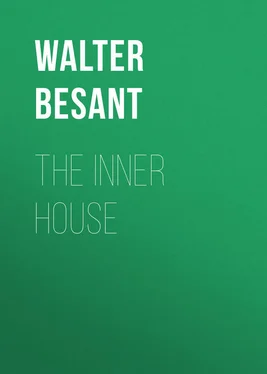I was going to reply, when suddenly a voice light, clear, and sweet broke upon our astonished ears. 'Twas the voice of a woman, and she was singing. At first I hardly listened, because I knew that it could be none other than the child Christine, whom, indeed, I had often heard singing. It is natural, I believe, for children to sing. But the Arch Physician listened, first with wonder, and then with every sign of amazement. How could he be concerned by the voice of a child singing silly verses? Then I heard the last lines of her song, which she sang, I admit, with great vigor:
"Oh, Love is worth the whole broad earth;
Oh, Love is worth the whole broad earth;
Give that, you give us all!"
"Grout," cried the Arch Physician, in tones of the deepest agitation, "I choke – I am stifled. Listen! They are words that I wrote – I myself wrote – with my own hand – long, long ago in the Past. I wrote them for a girl – the girl I told you of at dinner. I loved her. I thought never again to feel as I felt then. Yet the memory of that feeling has come back to me. Is it possible? Can some things never die? Can we administer no drug that will destroy memory? For the earth reeled beneath my feet again, and my senses reeled, and I would once more – yes, I would once more have given all the world – yes, life – even life – only to call that woman mine for a year – a month – a day – an hour!"
The Arch Physician made this astonishing confession in a broken and agitated voice. Then he rushed away, and left me alone in the summer-house.
The singer could certainly have been none other than the girl Christine. How should she get hold of Dr. Linister's love-song? Strange! She had disturbed our peace at supper by laughing, and she had agitated the Arch Physician himself to such a degree as I should have believed impossible by singing a foolish old song. When I went to bed there came into my mind some of the old idle talk about witches, and I even dreamed that we were burning a witch who was filling our minds with disturbing thoughts.
CHAPTER III
CHRISTINE AT HOME
When the girl Christine walked through the loitering crowd outside the Hall, some of the people looked after her with wondering eyes.
"Strange!" said a woman. "She laughed! She laughed!"
"Ay," said another, "we have forgotten how to laugh. But we used to laugh before" – she broke off with a sigh.
"And she sings," said a third. "I have heard her sing like a lark in the Museum."
"Once," said the first woman, "we used to sing as well as laugh. I remember, we used to sing. She makes us remember the old days."
"The bad old days" – it was one of the Assistant Physicians who admonished her – "the times when nothing was certain, not even life, from day to day. It should bring you increased happiness to think sometimes of those old times."
The first woman who had spoken was one whom men would have called beautiful in those old times, when their heads were turned by such a thing as a woman's face. She was pale of cheek and had black eyes, which, in those days of passion and jealousy, might have flashed like lightning. Now they were dull. She was shapely of limb and figure too, with an ample cheek and a full mouth. Formerly, in the days of love and rage, those limbs would have been lithe and active; now they were heavy and slow. Heaviness of movement and of eyes sensibly grows upon our people. I welcome every indication of advance towards the Perfect Type of Humanity which will do nothing but lie down, breathe, eat, and sleep.
Конец ознакомительного фрагмента.
Текст предоставлен ООО «ЛитРес».
Прочитайте эту книгу целиком, купив полную легальную версию на ЛитРес.
Безопасно оплатить книгу можно банковской картой Visa, MasterCard, Maestro, со счета мобильного телефона, с платежного терминала, в салоне МТС или Связной, через PayPal, WebMoney, Яндекс.Деньги, QIWI Кошелек, бонусными картами или другим удобным Вам способом.












